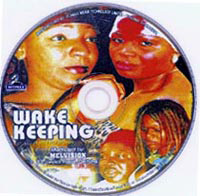Death: A Fund raising Strategy?

 |
| A Movie Depicting Wakes |
Africans of the sub-Saharan enclave rally for each other during hard times and it is so because they see themselves as a people [generally speaking] with meager resources should look after themselves [village and communal approach]; a social-communal dependency practice far greater than most comparable societies. As an African, one may live alone but when one dies, it is the business of others to bury one.
Fast forward to Nigerian/African immigrants in US, and one is exposed to a group with diverse backgrounds but still one that tends to be glued to a sense of 'we-are-in-this-together'. But what is this, 'we-are-in-this-together'? In death or serious situations Nigerians/Africans tend to rally but for other life enhancing and or self/community improvement agenda, they vanish until a death brings them together. It looks like Nigerians/Africans celebrate death and also rejoice in it because only death gets their attention. Attempt to inform them on how to better themselves is seen as not worthy and must not be pursued.
Every Friday in the US Nigerian community in Houston, Dallas, NY, LA, one is called to or informed of a wake keeping of some sort. It could be for a relation that died in a far away place or someone in US. The wake keeping is often to raise fund to help in transporting the body for burial at home. Nigerians respond as death in such community is seen as a community affair and one must not just come to commiserate but do so giving/donating money. The wakes are often in a commercial venue; meaning a venue is rented and some entertainment provided. Nigerians like and will donate/give if food, dance and drink are available. To many, attending a wake is a form of social release and gathering collectively in a way to say 'Thank God', I am still living. In such meetings, others are busy passing out flyers and reminding those present to come the following Friday or some other future date, as another person has died. It has become an industry of some sort and one laden with deceit and fraud; a turn off.
Never in any wake keeping will one see or hear, 'Please in place of donation, money should be sent to a hospital or research center to help find a cure for what the person died of'. Instead, a budget is provided as to what it will cost to send the body for burial, and hidden in that budget is money for the living because the upfront expenses have to be returned somehow.
Nigerians have commercialized wake keeping because there is a systemic style to wake keeping fundraising, and several wakes can be held in many locations for the same dead person. Due to what many hear about the behind scene or ulterior motive of the host[s], it has become questionable whether the wakes are actually for the benefit of the dead or an activity structured and emotionally pursued for the unsuspecting respondent to benefit the living.
Many hosts have collected money and did very little for the dead. It's not an uncommon to hear family members fighting each other as to ratio of share, whether to travel home for the burial ceremony, and so forth. And since the dead hardly send a 'thank you' note, it is hard to know whether they are pleased. It makes it hard for those needing the help to be helped. Since living in America avails many opportunities (such as insurance policies) that many Africans can not get back home, how come Africans are hesitant making use of such benefits?
Igbos have this saying; 'Heaven will pay. But is Heaven an insurance company'? In America, YES. If one signs up for a policy one gets the benefit upon death provided there is no violation of the terms of the policy. There are $100,000 term life policies and other such policy categories that one can obtain for as low as $20 or less per month. Instead of depending on others, why not take a look at sure provision in order to assist one's family in the case of (sudden) death?
It is important that we (Africans/Nigerians) educate ourselves of the benefits of such policies and purchase them. We cannot keep relying on others and subject them come to our aid when we could have done something slightly different to lessen the burden of dependency. There is always going to be someone who will not have a policy. But how about many who can but choose not to because they believe others will step in?
At least insurance companies in US honor every policy and the left over can help a family carry on. The contributions individuals make will never take the place of what an insurance policy will provide. There is life after burial and the surviving family needs cushion and such cushion comes when resources are left behind.
Africans in America, must take advantage of insurance policies and shy away from people-to-people dependency. For those that spend money to rent hall, cook food, provide DJ music and other entertainment, do us a favor. Instead of shelling that cost/expense upfront in anticipation of donations, tell folks how much one has and what else is needed. We can do without the wake turned into fundraising for the living. It does not do many any good to be reminded of death every Friday. It is depressing, and life in America can be depressing without the added death load.
Minimize or eliminate the 'hidden' commercial motives that are associated with wake keepings and respectfully do it for what it is.
ejike okpa ii
Dallas, Texas
